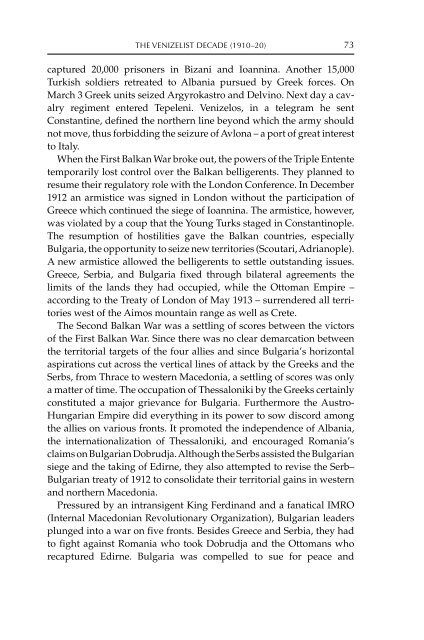MODERN GREECE: A History since 1821 - Amazon Web Services
MODERN GREECE: A History since 1821 - Amazon Web Services
MODERN GREECE: A History since 1821 - Amazon Web Services
You also want an ePaper? Increase the reach of your titles
YUMPU automatically turns print PDFs into web optimized ePapers that Google loves.
THE VENIZELIST DECADE (1910–20) 73<br />
captured 20,000 prisoners in Bizani and Ioannina. Another 15,000<br />
Turkish soldiers retreated to Albania pursued by Greek forces. On<br />
March 3 Greek units seized Argyrokastro and Delvino. Next day a cavalry<br />
regiment entered Tepeleni. Venizelos, in a telegram he sent<br />
Constantine, defined the northern line beyond which the army should<br />
not move, thus forbidding the seizure of Avlona – a port of great interest<br />
to Italy.<br />
When the First Balkan War broke out, the powers of the Triple Entente<br />
temporarily lost control over the Balkan belligerents. They planned to<br />
resume their regulatory role with the London Conference. In December<br />
1912 an armistice was signed in London without the participation of<br />
Greece which continued the siege of Ioannina. The armistice, however,<br />
was violated by a coup that the Young Turks staged in Constantinople.<br />
The resumption of hostilities gave the Balkan countries, especially<br />
Bulgaria, the opportunity to seize new territories (Scoutari, Adrianople).<br />
A new armistice allowed the belligerents to settle outstanding issues.<br />
Greece, Serbia, and Bulgaria fixed through bilateral agreements the<br />
limits of the lands they had occupied, while the Ottoman Empire –<br />
according to the Treaty of London of May 1913 – surrendered all territories<br />
west of the Aimos mountain range as well as Crete.<br />
The Second Balkan War was a settling of scores between the victors<br />
of the First Balkan War. Since there was no clear demarcation between<br />
the territorial targets of the four allies and <strong>since</strong> Bulgaria’s horizontal<br />
aspirations cut across the vertical lines of attack by the Greeks and the<br />
Serbs, from Thrace to western Macedonia, a settling of scores was only<br />
a matter of time. The occupation of Thessaloniki by the Greeks certainly<br />
constituted a major grievance for Bulgaria. Furthermore the Austro-<br />
Hungarian Empire did everything in its power to sow discord among<br />
the allies on various fronts. It promoted the independence of Albania,<br />
the internationalization of Thessaloniki, and encouraged Romania’s<br />
claims on Bulgarian Dobrudja. Although the Serbs assisted the Bulgarian<br />
siege and the taking of Edirne, they also attempted to revise the Serb–<br />
Bulgarian treaty of 1912 to consolidate their territorial gains in western<br />
and northern Macedonia.<br />
Pressured by an intransigent King Ferdinand and a fanatical IMRO<br />
(Internal Macedonian Revolutionary Organization), Bulgarian leaders<br />
plunged into a war on five fronts. Besides Greece and Serbia, they had<br />
to fight against Romania who took Dobrudja and the Ottomans who<br />
recaptured Edirne. Bulgaria was compelled to sue for peace and


